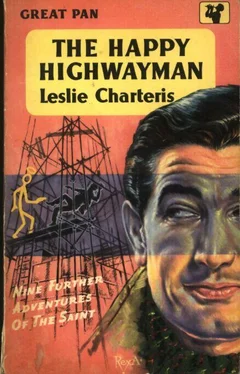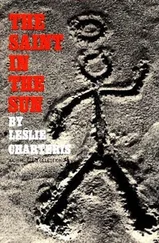Leslie Charteris - The Happy Highwayman
Здесь есть возможность читать онлайн «Leslie Charteris - The Happy Highwayman» весь текст электронной книги совершенно бесплатно (целиком полную версию без сокращений). В некоторых случаях можно слушать аудио, скачать через торрент в формате fb2 и присутствует краткое содержание. Год выпуска: 1939, ISBN: 1939, Издательство: Published, Жанр: Детектив, на английском языке. Описание произведения, (предисловие) а так же отзывы посетителей доступны на портале библиотеки ЛибКат.
- Название:The Happy Highwayman
- Автор:
- Издательство:Published
- Жанр:
- Год:1939
- ISBN:9789997508058
- Рейтинг книги:4 / 5. Голосов: 1
-
Избранное:Добавить в избранное
- Отзывы:
-
Ваша оценка:
- 80
- 1
- 2
- 3
- 4
- 5
The Happy Highwayman: краткое содержание, описание и аннотация
Предлагаем к чтению аннотацию, описание, краткое содержание или предисловие (зависит от того, что написал сам автор книги «The Happy Highwayman»). Если вы не нашли необходимую информацию о книге — напишите в комментариях, мы постараемся отыскать её.
American version.
The Happy Highwayman — читать онлайн бесплатно полную книгу (весь текст) целиком
Ниже представлен текст книги, разбитый по страницам. Система сохранения места последней прочитанной страницы, позволяет с удобством читать онлайн бесплатно книгу «The Happy Highwayman», без необходимости каждый раз заново искать на чём Вы остановились. Поставьте закладку, и сможете в любой момент перейти на страницу, на которой закончили чтение.
Интервал:
Закладка:
"What else makes him interesting?"
"He is very fond of ants," said Nordsten seriously, and the Saint sat up.
Then he finished his Dr.ink deliberately and put down the glass.
"Now I know that this climate doesn't agree with you," he said. "Let's get changed and go down to the tennis court. I'll put you in your place before we start the evening."
Nevertheless he Dr.ove over to Dr. Sardon's house that evening in a mood of open-minded curiosity. Scientists he had known before, men who went down thousands of feet into the sea to look at globigerina ooze and men who devised complicated electrical gadgets in laboratories to manufacture gold; but this was the first time that he had heard of a biologist who was fon,d of ants. Everything that was out of the ordinary was prospective material for the Saint. It must be admitted that in simplifying his own career to elementary equations by which obvious excrescences on the human race could be soaked, he did himself less than justice.
But there was nothing about the square smooth-shaven man who was introduced to him as Dr. Sardon to take away the breath of any hardened outlaw. He might perhaps have been an ordinary efficient doctor, possibly with an exclusive and sophisticated practice; more probably he could have been a successful stockbroker, or the manager of any profitable commercial business. He shook hands with them briskly and almost mechanically, seeming to summarize the Saint in one sweeping glance through his crisp-looking rimless pince-nez.
"No, you're not a bit late, Mr. Nordsten. As a matter of fact I was working until twenty minutes ago. If you had come earlier I should have been quite embarrassed."
He introduced his niece, a dark slender girl with a quiet and rather aloof beauty which would have been chilling if it had not been relieved by the friendly humour of her brown eyes. About her, Simon admitted, there might certainly have been things to attract the attention of a modern buccaneer.
"Carmen has been assisting me. She has a very good degree from Columbia."
He made no other unprompted reference to his researches, and Simon recognized him as the modern type of scientist whose carefully cultivated pose of matter-of-fact worldliness is just as fashionable an affectation as the mystical and bearded eccentricity of his predecessors used to be. Dr. Sardon talked about politics, about his golf handicap and about the art of Otto Soglow. He was an entertaining and effective conversationalist but he might never have heard of such a thing as biology until towards the close of dinner Ivar Nordsten skilfully turned a discussion of gardening to the subject of insect pests.
"Although, of course," he said, "you would not call them that."
It was strange to see the dark glow that came into Sardon's eyes.
"As a popular term," he said in his deep vibrant voice, "I suppose it is too well established for me to change it. But it would be much more reasonable for the insects to talk about human pests."
He turned to Simon.
"I expect Mr. Nordsten has already warned you about the — bee in my bonnet," he said; but he used the phrase without smiling. "Do you by any chance know anything about the subject?"
"I had a flea once," said the Saint reminiscently. "I called him Goebbels. But he left me."
"Then you would be surprised to know how many of the most sensational achievements of man were surpassed by the insects hunDr.eds of years ago without any artificial aids." The finger tips of his strong nervous hands played a tattoo against each other, "You talk about the Age of Speed and Man's Conquest of the Air; and yet the fly Cephenomia, the swiftest living creature, can outpace the fastest of your boasted aeroplanes. What is the greatest scientific marvel of the century? Probably you would say radio. But Count Arco, the German radio expert, has proved the existence of a kind of wireless telegraphy, or telepathy, between certain species of beetle, which makes nothing of a separation of miles. Lakhovsky claims to have demonstrated that this is common to several other insects. When the Redemanni termites build their twenty-five-foot conical towers topped with ten-foot chimneys they are performing much greater marvels of engineering than building an Empire State Building. To match them, in proportion to our size, we should have to put up skyscrapers four thousand feet high — and do it without tools."
"I knew the ants would come into it," said Nordsten sotto voce.
Sardon turned on him with his hot piercing gaze.
"Termites are not true ants — the term 'white ants' is a misnomer. Actually they are related to the cockroach. I merely mentioned them as one of the most remarkable of the lower insects. They have a superb social organization, and they may even be superior strategists to the true ants, but they were never destined to conquer the globe. The reason is that they cannot stand light and they cannot tolerate temperatures below twenty degrees centigrade. Therefore, their fields of expansion are for ever limited. They are one of Nature's false beginnings. They are a much older species than man, and they have evolved as far as they are likely to evolve… It is not the same with the true ants."
He leaned forward over the table, with his face white and transfigured as if in a kind of trance.
"The true ant is the destined ruler of the earth. Can you imagine a state of society in which there was no idleness, no poverty, no unemployment, no unrest? We humans would say that it was an unattainable Utopia; and yet it was in existence among the ants when man was a hairy savage scarcely distinguishable from an ape. You may say that it is incompatible with progress — that it could only be achieved in the same way that it is achieved by domestic cattle. But the ant has the same instincts which have made man the tyrant of creation in his time. Lasius fuliginosus keeps and milks its own domestic cattle, in the form of plant lice. Polyergus rufescens and Formica sanguined capture slaves and put them to work. Messor barbarus, the harvesting ant, collects and stores grain. The Attiini cultivate mushrooms in underground forcing houses. And all these things are done, not for private gain, but for the good of the whole community. Could man in any of his advances ever boast of that?"
"But if ants have so many advantages," said the Saint slowly, "and they've been civilized so much longer than man, why haven't they conquered the earth before this?"
"Because Nature cheated them. Having given them so much, she made them wait for the last essential — pure physical bulk."
"The brontosaurus had enough of that," said Nordsten, "and yet man took its place."
Sardon's thin lips curled.
"The difference in size between man and brontosaurus was nothing compared with the difference in size between man and ant. There are limits to the superiority of brain over brawn — even to the superiority of the brain of an ant, which in proportion to its size is twice as large as the brain of a man. But the time is coming…"
His voice sank almost to a whisper, and in the dim light of candles on the table the smouldering luminous-ness of his eyes seemed to leave the rest of his face in deep shadow.
"With the ant, Nature overreached herself. The ant was ready to take his place at the head of creation before creation was ready for him — before the solar system had progressed far enough to give him the conditions in which his body, and his brain with it, his brain which in all its intrinsic qualities is so much finer than the brain of man, could grow to the brute size at which all its potentialities could be developed. Nevertheless, when the solar system is older, and the sun is red because the white heat of its fire is exhausted, and the red light which will accelerate the growth of all living cells is stronger, the ant will be waiting for his turn. Unless Nature finds a swifter instrument than Time to put right her miscalculation…"
Читать дальшеИнтервал:
Закладка:
Похожие книги на «The Happy Highwayman»
Представляем Вашему вниманию похожие книги на «The Happy Highwayman» списком для выбора. Мы отобрали схожую по названию и смыслу литературу в надежде предоставить читателям больше вариантов отыскать новые, интересные, ещё непрочитанные произведения.
Обсуждение, отзывы о книге «The Happy Highwayman» и просто собственные мнения читателей. Оставьте ваши комментарии, напишите, что Вы думаете о произведении, его смысле или главных героях. Укажите что конкретно понравилось, а что нет, и почему Вы так считаете.












